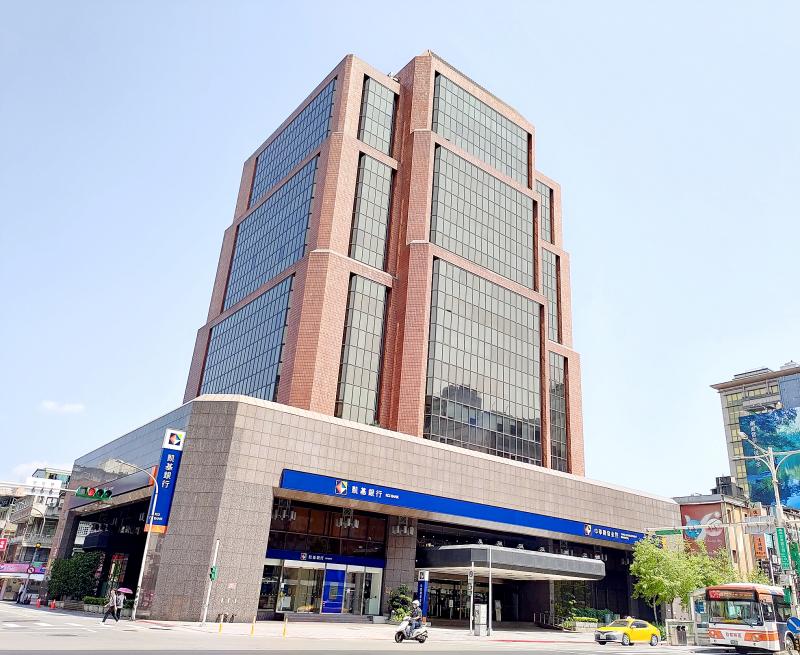Shin Kong Life Insurance Co (新光人壽) on Tuesday won a bid for the China Development Financial Holding Corp (中華開發金控) headquarters with an offer of NT$9.28 billion (US$326.24 million), beating a bid by China Life Insurance Co (中國人壽).
The life insurance arm of Shin Kong Financial Holding Co (新光金控) would use the building — on Nanjing E Road in Taipei’s Songshan District (松山) — as office space for its own use for the first five years, Shin Kong Financial spokesperson Sunny Hsu (徐順鋆) said by telephone yesterday.
The building would accommodate its employees or those of its affiliates, such as Shinkong Insurance Co (新光產險) and Shinkong Synthetic Fibers Corp (新光合成纖維), as those subsidiaries’ buildings are to be rebuilt over the next few years, Hsu said.

Photo courtesy of Cushman & Wakefield Taiwan
“The 35-year-old building is not unsafe or old, but after five years, we would consider rebuilding it via urban renewal and building a new commercial venue to earn stable rental income,” Hsu said.
With the incentives for urban renewal, Shin Kong Life expects to build a 19-story building with a total floor area of 9,700 ping (32,066m2) compared with the current 16-story building’s 8,000 ping, he said.
A preliminary estimate indicates that the new building would generate a higher rate of return than the regulatory minimum, Hsu said.
Shin Kong Life, which owns six buildings along Nanjing W and Nanjing E roads in Datong (大同), Zhongshan (中山) and Songshan districts, expects demand for office space in the area to gain momentum, Hsu said.
The company aims to revitalize its other 190 buildings this year, he said.
It would talk with China Development Financial to decide a timeframe for handing over the building, as its employees still work in the building while the firm’s new headquarters is being finished, he said.
China Development Financial, the parent company of the building’s owner, CDIB Capital Group (中華開發資本), would recognize disposal gains of NT$8 billion from the deal, China Development Financial said in a filing on Tuesday.
“We could not fully recognize the NT$9.28 billion, as we needed to subtract the building’s construction costs from the bid price,” China Development Financial spokesman Richard Chang (張立筌) said by telephone.
It would recognize the disposal gains when receiving the payments, while Shin Kong Life would pay in four installments, Chang said.
The proceeds from the auction would not be used to acquire a greater stake of China Life Insurance via a public tender offer, Chang said, referencing a Financial Supervisory Commission order, adding that they would boost China Development Financial’s return on equity.

GROWING OWINGS: While Luxembourg and China swapped the top three spots, the US continued to be the largest exposure for Taiwan for the 41st consecutive quarter The US remained the largest debtor nation to Taiwan’s banking sector for the 41st consecutive quarter at the end of September, after local banks’ exposure to the US market rose more than 2 percent from three months earlier, the central bank said. Exposure to the US increased to US$198.896 billion, up US$4.026 billion, or 2.07 percent, from US$194.87 billion in the previous quarter, data released by the central bank showed on Friday. Of the increase, about US$1.4 billion came from banks’ investments in securitized products and interbank loans in the US, while another US$2.6 billion stemmed from trust assets, including mutual funds,

Micron Memory Taiwan Co (台灣美光), a subsidiary of US memorychip maker Micron Technology Inc, has been granted a NT$4.7 billion (US$149.5 million) subsidy under the Ministry of Economic Affairs A+ Corporate Innovation and R&D Enhancement program, the ministry said yesterday. The US memorychip maker’s program aims to back the development of high-performance and high-bandwidth memory chips with a total budget of NT$11.75 billion, the ministry said. Aside from the government funding, Micron is to inject the remaining investment of NT$7.06 billion as the company applied to participate the government’s Global Innovation Partnership Program to deepen technology cooperation, a ministry official told the

Taiwan Semiconductor Manufacturing Co (TSMC, 台積電), the world’s leading advanced chipmaker, officially began volume production of its 2-nanometer chips in the fourth quarter of this year, according to a recent update on the company’s Web site. The low-key announcement confirms that TSMC, the go-to chipmaker for artificial intelligence (AI) hardware providers Nvidia Corp and iPhone maker Apple Inc, met its original roadmap for the next-generation technology. Production is currently centered at Fab 22 in Kaohsiung, utilizing the company’s first-generation nanosheet transistor technology. The new architecture achieves “full-node strides in performance and power consumption,” TSMC said. The company described the 2nm process as

JOINT EFFORTS: MediaTek would partner with Denso to develop custom chips to support the car-part specialist company’s driver-assist systems in an expanding market MediaTek Inc (聯發科), the world’s largest mobile phone chip designer, yesterday said it is working closely with Japan’s Denso Corp to build a custom automotive system-on-chip (SoC) solution tailored for advanced driver-assistance systems and cockpit systems, adding another customer to its new application-specific IC (ASIC) business. This effort merges Denso’s automotive-grade safety expertise and deep vehicle integration with MediaTek’s technologies cultivated through the development of Media- Tek’s Dimensity AX, leveraging efficient, high-performance SoCs and artificial intelligence (AI) capabilities to offer a scalable, production-ready platform for next-generation driver assistance, the company said in a statement yesterday. “Through this collaboration, we are bringing two